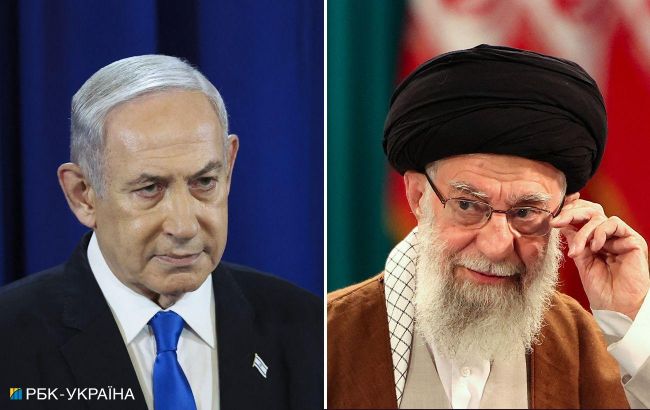How possible is major war in the Middle East: What you need to know
 Benjamin Netanyahu and Ali Khamenei (Photo: collage by RBC-Ukraine)
Benjamin Netanyahu and Ali Khamenei (Photo: collage by RBC-Ukraine)
The escalation in the Middle East is intensifying - Iran and Israel are discussing the possibility of direct strikes on each other's territories. RBC-Ukraine explains the essence of this conflict and whether a major war might begin.
Contents
- What is the essence of the conflict between Iran and Israel
- Why is there talk of a major war following the assassination of Haniyeh
- Will Iran launch an attack on Israel
- Will Israel carry out a preemptive strike on Iran
What is the essence of the conflict between Iran and Israel
Israel and Iran have been antagonistic since 1979, when the Islamic Revolution in Tehran resulted in a new political regime that began the "export of revolution," declaring a "struggle against Zionism" and "Western colonialism." As part of this policy, Iran supports various armed groups across the Middle East that have previously attacked Israel. Among these, Hezbollah in southern Lebanon, Hamas, and Islamic Jihad in the Gaza Strip are the most active against Israel.
Israel has been conducting a military operation in Gaza for several months, while constant rocket attacks from Hezbollah have been hitting Israeli territory. On July 31, in response to a recent attack, Israel eliminated a senior advisor to the Hezbollah leader, Fouad Shukr, also known as Haj Mohsen. Shortly thereafter, the head of the Hamas political bureau, Ismail Haniyeh, was killed in Tehran, where he had arrived for the inauguration of the country’s newly elected president.
Why is there talk of a major war following the assassination of Haniyeh
Although Israel has not directly acknowledged involvement in the assassination of Haniyeh, the Iranian leadership immediately blamed Tel Aviv. This is partly due to the timing of Haniyeh's death coinciding with the killing of Fouad Shukr in Beirut. Additionally, Israeli intelligence has previously successfully eliminated less public figures in Iran, particularly scientists associated with the nuclear program.
The assassination of Haniyeh, against the backdrop of the inauguration of Iran's newly elected president, is seen as a public humiliation for the Iranian leadership. Specifically, the incident in Tehran demonstrates that Iranian intelligence services are unable to protect leaders of key allied groups fighting against Israel.
Immediately after the incident, Iran's Supreme Leader Ayatollah Ali Khamenei declared that Iran considers it a duty to avenge the murder of Ismail Haniyeh, as he was killed on Iranian soil.
A direct attack on Israel from Iranian territory, according to international law, would constitute an act of aggression against the state of Israel. In response, the Israeli leadership would have the legal right to openly retaliate, potentially triggering a "domino effect" of mutual strikes and counterstrikes. In this scenario, other Iran-aligned groups would likely join the conflict. On the side of Israel, there might be indirect participation from several Arab countries opposed to Iran. Additionally, the US, the UK, and some other European countries are monitoring the situation and may be prepared to assist Israel in repelling a possible Iranian aerial attack.
Will Iran launch an attack on Israel
Ayatollah Ali Khamenei has reportedly ordered a direct strike on Israel, according to The New York Times, citing sources within the Iranian leadership. The Iranian military is considering a combined attack using drones and missiles targeting military sites around Tel Aviv and Haifa.
US Secretary of State Antony Blinken stated during a meeting with G7 foreign ministers that an Iranian attack on Israel could begin as early as August 5.
Blinken noted that it is currently unclear how Iran will execute the attack. However, the United States is convinced that the Lebanese group Hezbollah will also participate. Preliminary information suggests the involvement of other Iranian allies in the region is possible.
Meanwhile, Iranian Foreign Ministry spokesperson Nasser Kanaani stated on August 5 that Iran is against escalating the conflict "but it is necessary to punish Israel".
"Iran seeks to establish stability in the region, but this will only come with punishing the aggressor and creating deterrence against the adventurism of the Zionist regime," Kanaani said.
Additionally, Iran is restrained by the potential revival of the so-called nuclear deal and the political uncertainty in the United States surrounding upcoming elections.
Will Israel carry out a preemptive strike on Iran
According to Ynet, the Israeli leadership is considering the possibility of preemptive actions, including in Lebanon or potentially other locations if necessary. However, such a move would only be considered if Israel receives intelligence confirming Iran's intentions to launch an attack. This was discussed on August 4 during a meeting between Israeli Prime Minister Benjamin Netanyahu and military and intelligence leaders.
The Times of Israel notes that Israel currently does not know what to expect from Iran and its allies, so it is exploring various response options or ways to prevent an attack.
Sources: public statements by Israeli, American, and Iranian politicians, as well as materials from Ynet, Times of Israel, and The New York Times.

